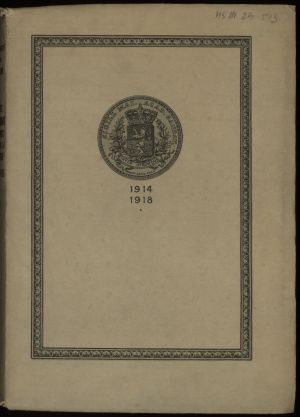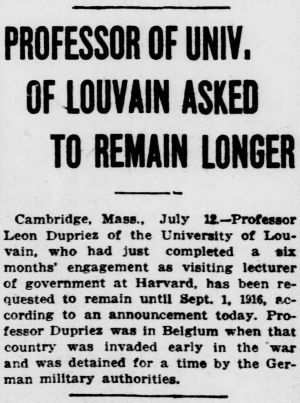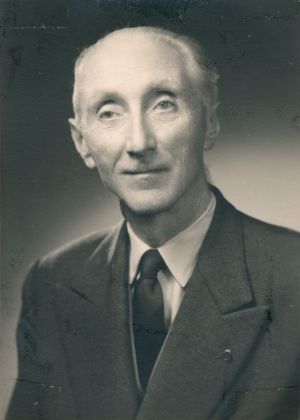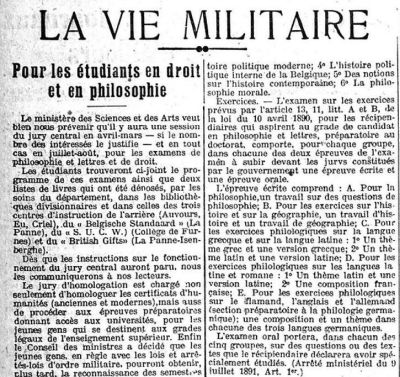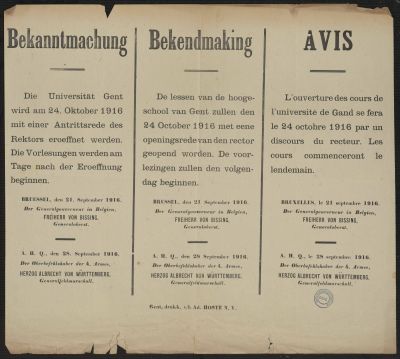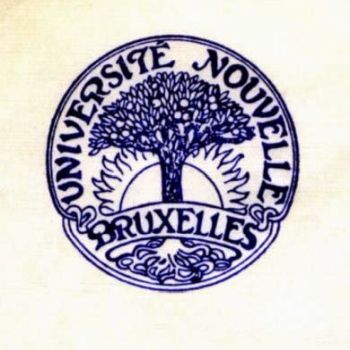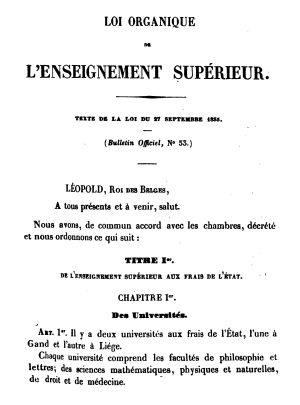Those who gave their lives for an ideal of justice, those who died for the law, have left the survivors a legacy that must not be made up solely of contempt and hatred. Paul Héger, Academic opening session of the Free University of Brussels, January 21, 1919. Confronted with the magnitude and violence of the mass death caused by the Great War, the deep trauma that ensued drove society towards an irrepressible need to mourn and remember those lost. Mourning is an intrinsic part of the war experience. It is present from the outset of combat and continuing after the war, and is a bond that unites combatants and non-combatants in the loss of a son, husband, brother, or “comrade”. Its expression is multifaceted : it tends topour lire la suite…
Tag: Belgium
The Leuven Faculty of Law : Professors in War
On the eve of the war, in 1914, the Leuven Faculty of Law had fifteen tenured professors, and two professors emeriti. Some of these professors has another profession on top of teaching. They were, for some of them, active in the Catholic Party, and the cumulation with a political mandate, at the local or national level, or with a ministerial position was quite common. The war affected their activities in several ways. The start of the war and the events of August 1914 particularly brutally affected the city of Leuven, and the university even more. On August 2, 1914, Germany sent an ultimatum to the Belgian government. Less than forty-eight hours later, the first houses were set on fire near the German border. On August 5, the Belgianpour lire la suite…
“War Diary” by Paul Demeur
Paul Demeur’s “War Diary” is not a war diary. In 1964, Paul Demeur, a lawyer at the Court of Cassation, was asked to join the editorial board of the Journal des Tribunaux, Belgium’s leading legal periodical. At the time, Paul Demeur was a leading figure in Belgian legal circles in the second half of the 20th century, both as a lawyer at the Court of Cassation and as a professor at the Catholic University of Louvain. Fifty years after the outbreak of war, the editorial board felt it “appropriate to evoke […] the memory of those jurists, magistrates and lawyers, both practicing and aspiring, who did not, at the time, remain insensitive to the call of the country, and who’s simple and pure examples still nourish ourpour lire la suite…
The right of Belgian student soldiers
The German invasion, in August 1914, pushed part of the student population into the army. They were forced to interrupt their higher education. The necessities of war prevented the resumption of structured scholarly activity in the first months after the German invasion. It was only a year later, in September 1915, that there was a desire among the army and conscripts for a resumption of studies. This desire was expressed by the army medical auxiliaries, who had not had the opportunity to take their last medical doctorate finals and who wanted to see an examination panel organized so that they could complete their education and obtain their degree. The War Department vetoed it : the organization of an examination panel for students of the 3rd doctoratepour lire la suite…
The “Von Bissing University” in academically locked Belgium
The establishment of the Vlaamsche Hoogeschool, better known as the “Von Bissing University”, marks a high point in the period of occupation and the relations between the occupying authorities, Flemish activists and “patriots” during this period. While, in the context of the occupation, universities closed, an academic institution was created in Flanders — in Ghent — in 1916, with the support of German authorities. Presenting this moment and this particular institution requires to situate it in the context of the Flemish claims that had been developing in the previous decades. Since independence, Belgium had made French its only official language and had neglected the Flemish language and culture. All education was given in French. The Flemish movement, which had been developing in Belgium since thepour lire la suite…
A space to maintain law education in Brussels : the New University
The German invasion in August 1914 was soon followed by the occupation of most of the country. The context of war and occupation was an obstacle to the resumption of classes : many of the professors and students had either fled or joined the military. . In Leuven, the sack of the city, the massacre and the fire of the university library represented major obstacles. In Liège, the ransacking of the university’s premises prevented any resumption under “normal” conditions. These circumstances led the four universities of Belgium at the time, the State Universities of Liège and Ghent and the Free Universities of Brussels and Leuven, to close their doors. At the Free University of Brussels, the start of the new academic year, scheduled for October 14,pour lire la suite…
The Belgian academic landscape before the First World War
The Belgian academic landscape as it had developed from the first law on higher education of September 27, 1835 is the result of a historic connection as well as a parliamentary consensus on freedom of education, geographical decentralization and structural centralization. The history of higher education in Belgium in the contemporary era began at the turn of the 19th century, when the “Belgian” space annexed to the Republic, a bundle departments, saw in 1797 the closure of the former University of Leuven. It was a casualty of the abolition of universities by the decision of the National Convention of September 15th, 1793. After a period of apparent vacancy, higher education in the “combined” departments was subject to Napoleonic reforms. The Act of Ventôse 22, XIIpour lire la suite…

